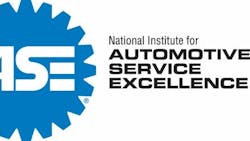ASE to host webinar on electronic system diagnostic strategies
The National Institute for Automotive Service Excellence (ASE) is hosting a free webinar for service technicians on Friday, March 12 at 4 PM ET entitled “Electronic System Diagnostic Strategies.”
Whether an ECM, BCM, TCM, or PCM, they all operate on similar electronic principles. During the webinar, attendees will learn how computers measure input values, process information, and control outputs, as well as how to interpret scan tool data and devise electrical pin checks to develop a diagnostic strategy. The webinar will also examine how electronic control units determine faults and set codes.
For those who are not sure they can attend, we encourage them to register so they receive a follow-up email with details on how to attend a recorded session, if available. After registering, a confirmation email will be sent containing information about joining the webinar.
For more information or to register, click here.
